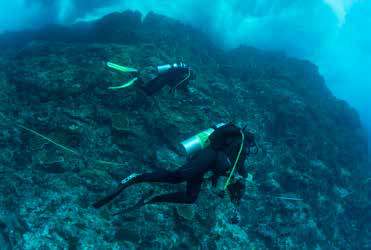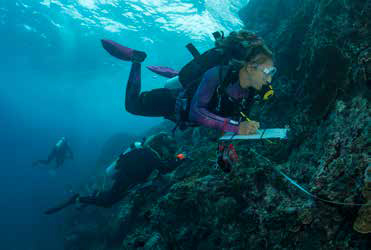NSW Department of Primary Industries, Lord Howe Island Marine Park News, The Lord Howe Island Signal
Reef Life Survey (RLS) have released a new report outlining results from long-term monitoring of shallow reefs in the Lord Howe Island Park (LHIMP). RLS is a volunteer-based citizen science program which has been surveying reefs to 30m depth in the LHIMP for nearly two decades. Trained RLS divers, with the support of LHIMP staff and local dive companies, have undertaken over 1000 surveys across 45 sites using standardised underwater visual survey methods since 2006.
The recent report provides a comprehensive overview of long-term health, patterns and trends on these reefs. This includes detailed analysis of the diversity, biomass and abundance of reef species including fish, invertebrates, coral and seaweed. This makes an invaluable contribution to our understanding of shallow reef ecosystems in the LHIMP. It also represents the marine park’s longest continuous data set, making it crucial for monitoring reef health and changes into the future.
Some interesting patterns and important trends are presented in the report. For example, it includes a description of four distinct types of shallow reefs in the LHIMP known as Ecological Communities. The first of these is the Lagoon Ecological Community, characterised by tropical fish and high coral cover, with particularly high diversity in the Lord Howe Island Lagoon Sanctuary Zone. This Ecological Community also provides critical habitat and nursery areas for endemic, threatened and protected species including McCulloch’s Anemonefish (Amphiprion mccullochi), Doubleheader (Coris bulbifrons), Bluefish (Girella cyanea), and Black Rockcod (Epinephelus daemelii).
The second Ecological Community includes offshore reefs around Lord Howe Island, where current-loving (rheophilic) species thrive, including sea sponges, black corals and gorgonian sea-fans. These reefs also support the greatest biomass of fish and are key habitat for regionally endemic species such as the Halfbanded Angelfish (Geniacanthus semicinctus) and Wideband Anemonefish (Amphiprion latezonatus). The greatest fish biodiversity and biomass occurs on offshore reefs in the Neds Beach & Admiralty Islands Sanctuary Zone.
Reefs surrounding Balls Pyramid represent another distinct Ecological Community with a unique assemblage of species. These reefs are particularly important for several iconic and regionally endemic fish species, including the Conspicuous Angelfish (Chaetodontoplus conspicillatus), Lord Howe Butterflyfish (Amphichaetodon howensis), and Splended Hawkfish (Notocirrhitus splendens). Hotspots for diversity and biomass on these reefs occur within the Observatory Rock Sanctuary Zone.
Lastly, a small but highly unique Ecological Community occurs on the outer reefs of the southern lagoon, an area known as the ‘Algal Holes’. These reefs are covered in lush growth of diverse seaweeds, including many species which occur nowhere else in the world. These reefs support large populations of herbivores including Bluefish (Girella cyanea) and the endemic Onion Turban Sea Snail (Turbo cepoides).
The report also investigates changes on these reefs over time, showing that they have remained relatively stable and healthy throughout the history of the marine park. Some of the greatest changes include fluctuations in sea urchin numbers and seaweed cover, which will continue to be carefully monitored. Climate change impacts have also been detected, including reductions in coral cover, coral-feeding fish such as butterflyfish, and the endemic and Critically Endangered McCulloch Anemonefish (Amphiprion mccullochi). Lastly, the report outlines other ongoing threats to these iconic reefs and opportunities to help protect and preserve them into the future.
RLS is an Australian citizen science project, and their website is a fantastic resource to learn about their efforts and approach to citizen science: https://reeflifesurvey.com. The organisation has also launched an online interactive tool called Reef Life Explorer, to make information about global reef health more accessible: https://reeflifesurvey.com/explorer.
Any residents interested in becoming RLS members are welcome to contact marine park staff for further information. Please also contact marine park staff to obtain a digital copy of the report.
This article appeared in The Lord Howe Island Signal, 30 June 2025.




